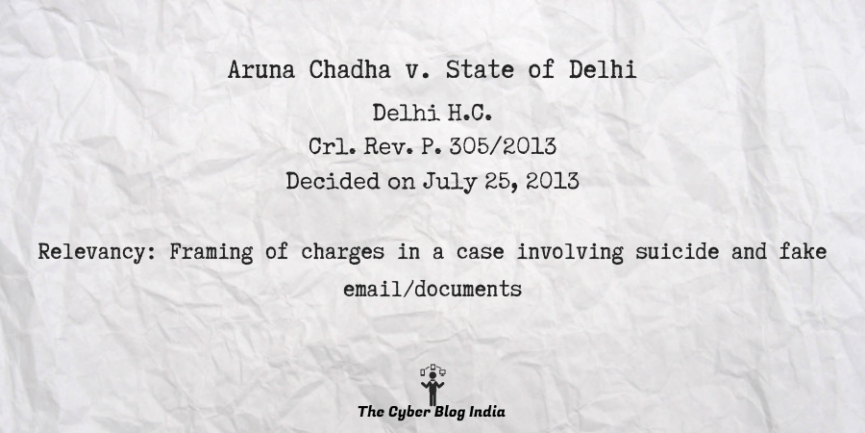Aruna Chadha v. State of Delhi

Aruna Chadha v. State of Delhi
(2013) 205 DLT (CN) 4
In the High Court of New Delhi
Crl. Rev. P. 305/2013
Before Justice G.P. Mittal
Decided on July 25, 2013
Relevancy of the case: Framing of charges in a case involving suicide and fake email/documents
Statutes & Provisions Involved
- The Information Technology Act, 2000 (Section 66)
- The Indian Penal Code (Section 120B, 468, 469, 471, 376, 377)
- The Code of Criminal Procedure, 1973 (Section 397, 399, 401, 482)
Relevant Facts of the Case
- The deceased committed suicide at her residence, leaving two suicide notes behind. She has held two people responsible for her extreme step, Aruna Chadha (accused) and Gopal Goyal Kanda (co-accused). The family and co-workers were interrogated during the investigation.
- She was working with Emirates Airlines in Dubai. Before getting that job, she was working in MDLR. She was agitated and harassed for the issuing of the No Objection Certificate (NOC) for the commencement of her job in Emirates.
- The petitioner and the co-accused forged a NOC and made the Vice President of MDLR sign the same. This was to make sure she does not get a job in Emirates.
- She resigned from Emirates and came back to India. Gopal Goyal Kanda with his employees managed to send her a fake e-mail from a fake account created by CSS. The account was under the name of Sheikh Basir Al Bhoram (Director of Emirates Group in Dubai). A letter from the Counsel General of India was attached with the mail.
- The petitioner had been charged for the offence of forgery under Section 468, 469 and 471 of the Indian Penal Code, 1860 and Section 66 of the Information Technology Act, 2000 r/w Section 120B of the Indian Penal Code, 1860.
- Also, even though the petitioner is a lady and cannot be charged under Section 376 and 377 of the Indian Penal Code, 1860, these provisions were included in the complaint.
Opinion of the Bench
- The bench agreed with the trial court that alleged acts amount to offences under Sections 468, 469, 471 of the Indian Penal Code, 1860 and Section 66 of the Information Technology Act, 2000 r/w Section 120B of the Indian Penal Code, 1860 as a fake email was generated and sent to the deceased and forgery of NOC was done to pressurize the deceased.
- The bench referred to the evidence collected and it showed conspiracy of the offences committed.
Final Decision
- The petition is partly allowed where the charges framed under Section 376 and 377 of the Indian Penal Code, 1860 are set aside..
